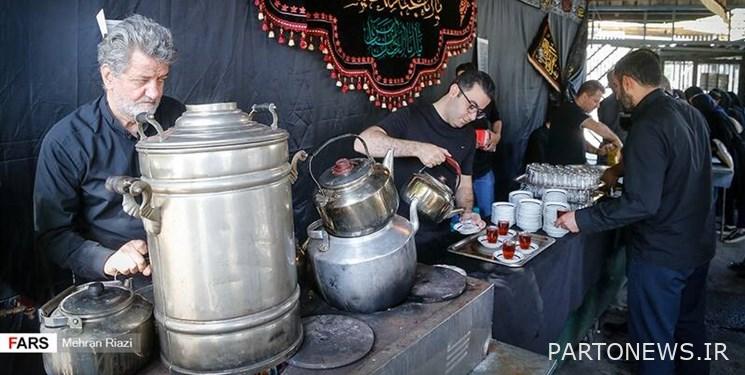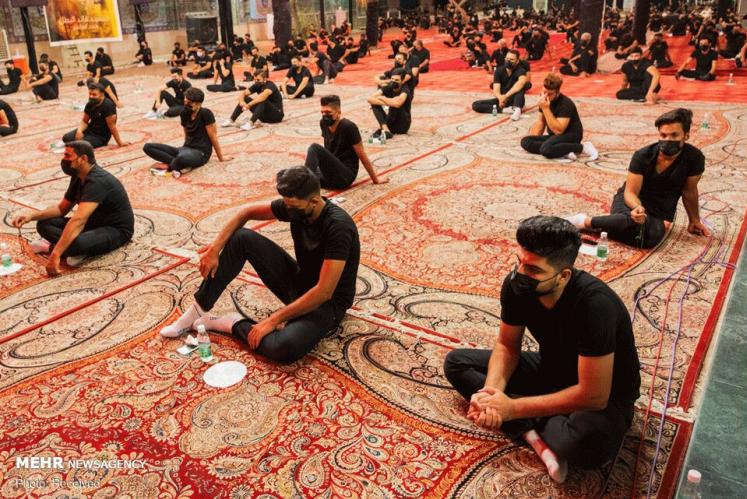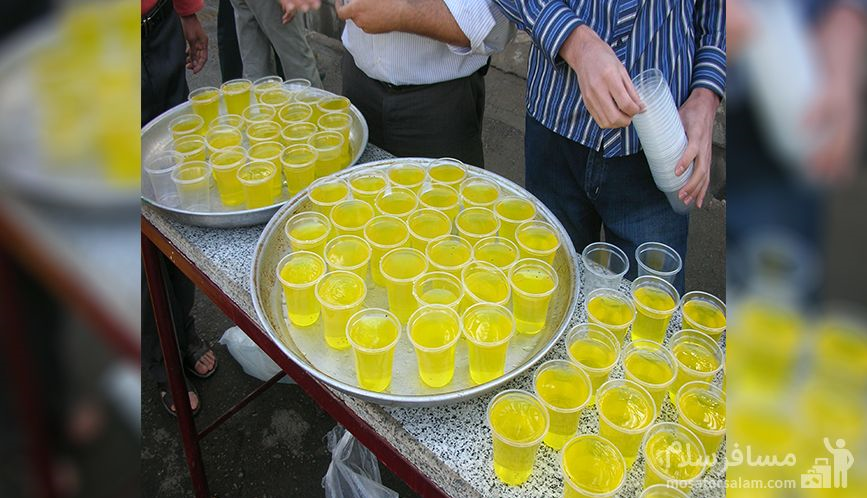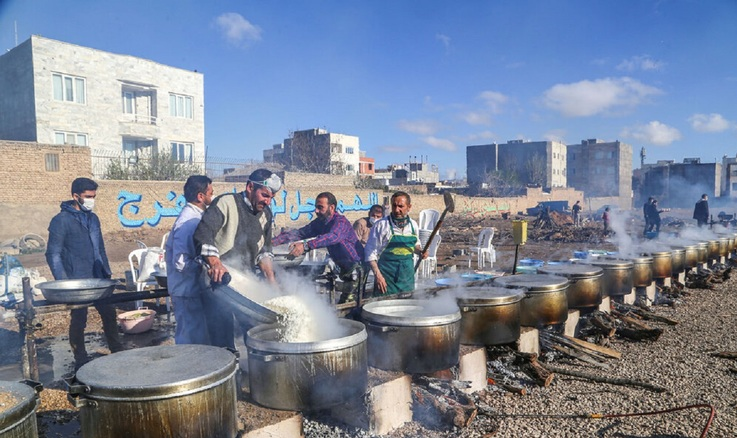
Health Department of Fars News Agency: The month of Muharram, the month of mourning for Imam Hussain (a.s.) and his companions, has begun with a special enthusiasm and the call of Hussain and the mourning drum of Seyyed al-Shahada (a.s.) is heard in every village and barzani.
This year, the mourning ceremony of the Muharram days is in the third year of the virus outbreak coronavirus will be held; Of course, the situation Corona The country is in a more favorable condition compared to the last two years, but observing some health tips, especially in holding mourning ceremonies in religious bodies, is a very important issue that preserves the health of Hosseini mourners and preserves the great dignity of these days of grief and sorrow, which is mentioned in this report. We point out important health points that religious bodies and Hosseini mourners should pay attention to in order to ensure health.
A believer is clean and observes cleanliness, and by doing so, he respects the rights of himself and others. Socially and religiously, religious places have a special place among Muslims; Therefore, maintaining their cleanliness and hygiene is very important.
Mosques, takayas, hosseiniyehs, etc Boards Religion is importantthe most There are religious possibilities where many ceremonies such as congregational prayers and mourning ceremonies are held. The population density and distribution of food among the mourners in this possibility have the potential to transmit infectious diseasesincrease Gives; As a result, compliance with hygiene and cleanliness standards is not only important from a legal point of view, but also from a religious point of view, and it has been emphasized in the traditions as examples of faith.
Health tip in mosques, takayas, hosseiniyehs and religious groups
The entry ways of mosques and religious groups can easily be a place for dust and pollutants to accumulate because they are not covered. Therefore, it requires more attention to comply with health issues. These places should be clean and free from pollution and appropriate measures should be taken to collect waste.
A garbage container with a lid along with a garbage bag should be placed in a corner of the courtyard of mosques and religious groups.
Clean the carpets of mosques and religious groups regularly, preferably with a vacuum cleaner.
Avoid spilling food on the carpet; In addition, it is necessary to observe personal hygiene and periodically wash carpets according to their cleanliness.
Tents, mats and stamps
In most mosques, there are light-colored tents for the use of the worshipers in a special shelf, but it is better for the worshipers to use their personal belongings; But it is necessary to observe some points in this sacred possibility. Like carpets should be washed once in a while.
The surface of the seals should be periodically cleaned with sandpaper.
To prevent contamination rosaryWashable items should be disinfected with disinfectants.

ablution
Ablution should be performed inside the mosques with tap water, and even if possible, to prevent the spread of diseases, the water in the mosque pool should not be used.
Drinking water
The water used must be approved by the local health authorities. To drink water, use water coolers that pump water up Outburst They give priority.
It is preferable to use disposable glasses for drinking water.
On these days, on the occasion of the days of mourning, syrup and various drinks are distributed among the mourners. Distribution of water, syrup or milk among the mourners should be done with a disposable glass and it should be avoided to put the glass and pitcher into the containers that contain water and syrup.
Use hygienic packaged ice.
Unpackaged molded ice can only be used indirectly to cool food containers.
Wastewater
entire Wastewaterproductions such as sewage ablutiontoilets, cisterns, and kitchens, if they are active, should be disposed of in a hygienic manner and prevent unsanitary spillage into the environment.
Personal hygiene of those who receive the mourners
Those who work in the aqueducts of mosques and religious bodies must be healthy in terms of infectious diseases; Because if they have contagious diseases, they can also infect other people. Therefore, paying attention to personal hygiene by these people is necessary and guarantees the health of themselves and the mourners; As a result, it is very important to observe the following.
1- The employees of the water house, kitchen and all those who deal with the distribution of water, tea and any kind of food must have a valid health card, while the mentioned people must use masks.
2- It is mandatory for these people to wear light-colored robes and observe complete personal hygiene. The drinking fountain should have soap, preferably liquid soap for washing, and its employees should have disposable towels and napkins.
shoe store
In mosques and religious organizations that have a shoe store, the employees of this area must wear appropriate gowns, gloves, and masks while working.

During the distribution of food, the distributors or servants should refrain from walking on the table.
Use overalls and gloves when necessary Work It is essential in the kitchen or when distributing food.
Use disposable tablecloths when throwing the tablecloth.
The bread used for the mourners should be placed in a freezer bag during the distribution of offerings and should not be placed and separated by different people.
dishes
In view of the fact that in many cases in mosques and religious bodies, reception or feeding is done on various occasions, therefore paying attention to the characteristics of the dishes used and the correct way of storing and washing them is of particular importance. possess Is.
First, the type of dish should be selected according to the reception.
For example, the use of single-use plastic containers is not suitable for the distribution of foods that are hot in nature, and these containers can only be used for the distribution of cold or lukewarm foods, if the containers are not disposable and are reused after washing. (For example, Estkan and glass glass) should be paid special attention to how to wash and then store them until they are used again; Because if they are not properly disinfected and washed, they can make other people sick as a source of contamination.
The following points regarding the hygiene of dishes
Utensils used in the mosque or hosseiniyeh and takayas and boards should be cleaned with detergents and disinfectants and then stored in places with closed doors (closets, etc.).
One-time use containers should be used in suitable sizes and according to the type of food when serving.
To prevent contamination by insects and rodents (such as flies and mice), it is necessary to keep food storage containers closed.
Glasses and saucers should be washed with water, detergents and disinfectants.
appointment to give A container of water and washing all the glasses in it and using that water several times is an unhygienic method and can cause an epidemic of infectious diseases.
Avoid using cups or glasses with faded and defective lips.
Using shared utensils increases the possibility of spreading infectious diseases and such work is prohibited if they are not washed and disinfected.
If fruit and vegetable salad is distributed in the mosque, it should be done in a proper way sanitization (Washing, disinfection, disinfection and final washing be and then distribute.
Disposable dishes
using dishes Poly-based disposable Styrene And similar things that are petroleum derivatives, in addition to threatening the health of users, because they are not degradable, they can remain in the environment (water, soil) for years and then the chain Human food returns as a chemical pollutant.

Therefore, the use of disposable plastic containers for hot and hot foods and drinks is prohibited, and for other foods, vegetable disposable containers are preferred over plastic disposable containers.
In order to improve the health level of the society, in all the cooking, preparation, supply and serving centers of food and beverages, disposable vegetable containers with a legal license from the Ministry of Health must be used, which not only do not cause problems for the health of the users, but also because they are natural It is degradable and destroys the environment.
Just as the hygienic distribution of food in suitable containers is important, the proper collection and disposal of containers after consumption is also very important; Therefore, taking the necessary measures to collect and quickly transfer food waste and containers, such as providing a sufficient number of large waste containers, can play a decisive role in controlling the pollution caused by the release of disposable containers and waste in the environment.
Garbage
Garbage is one of the factors that can easily pollute the environment and expose worshipers and mourners to different diseases; Therefore, special attention should be paid to collection, storage and He disposed of it properly.
In order to collect garbage, mosques and religious groups should have sufficient number of plastic or metal garbage containers with stainless and washable lids, and the garbage should be emptied daily and regularly; Also, avoid throwing garbage and waste materials inside the mosque and its surrounding area.
Compliance with ergonomics in assemblies Mourning in the month of Muharram
In doing things according to your physical condition Attention you have. Never work for a long time in an improper posture that causes pain and discomfort in the body parts.
Doing long-term work in a standing position causes discomfort in the legs and lower back.
Doing work in a sitting position, without having a support in the lower back, which does not provide any support for the back of the chair, causes discomfort in the lower back.
Communicable diseases in public places
Mosques and religious bodies are among the public facilities that, due to the gathering of people and population density on the one hand, and the catering and distribution of food among Muslims on the other hand, they can provide the conditions for the transmission of some diseases between people if some health tips are not observed. .
Corona, cold, influenza, cholera, typhoid, food poisoning are among the diseases that have the potential to be transmitted to people in public places such as mosques and religious places. These diseases can be transmitted through sneezing and coughing, food, contaminated dishes and hands, and insects.
Acquainting clerics, mosque custodians and even worshipers and mourners with the ways of transmission and control of these diseases will lead to the adoption of measures andto do Measures such as proper ventilation, disinfection, vegetables, air purification, spraying, environments susceptible to mosquito growth, washing Appropriate Utensils, compliance with personal hygiene by people working in the kitchen and abattoir, and food hygiene from the spread of the above diseasesthe mention It should be prevented, which will result in the improvement of health and continuous and widespread presence of Muslims in religious places and religious groups.

Personal hygiene of mourners and participants in religious delegations
Considering that we are in the days of the corona virus and its resurgence, it is necessary to use a mask in closed places; Also, make sure to change your mask as soon as it gets wet and throw the used mask in the trash.
Covering the mouth and nose with a handkerchief (preferably) or the upper part of the sleeve when coughing and sneezing
Sanitary disposal of handkerchiefs contaminated with oral and nasal secretions
Avoid shaking hands, kissing and hugging people with symptoms of respiratory disease
washing Correct dishes, glasses and saucers
Proper air conditioning inside the building
Monitoring food preparation and preventing water and food contamination with feces
Correct and complete washing of hands with soap and water after using the toilet and before eating
Use of safe drinking water
Resting at home and avoiding contact with others
Disinfection of vegetables and fruits
Not using common utensils and dishes

Improving the environment
Correct and hygienic excrement
Regular washing and disinfection of sanitary facilities (bathrooms and toilets) is one of the important things that can ensure the health of oneself and others.
Remember! Participating in the mourning ceremony of Imam Hussain (a.s.) when it is accompanied by respecting the rights of others and the rights of the people, has a higher reward and causes peace of mind for oneself and other mourners. Let’s not violate the rights of others.
end of Message/

